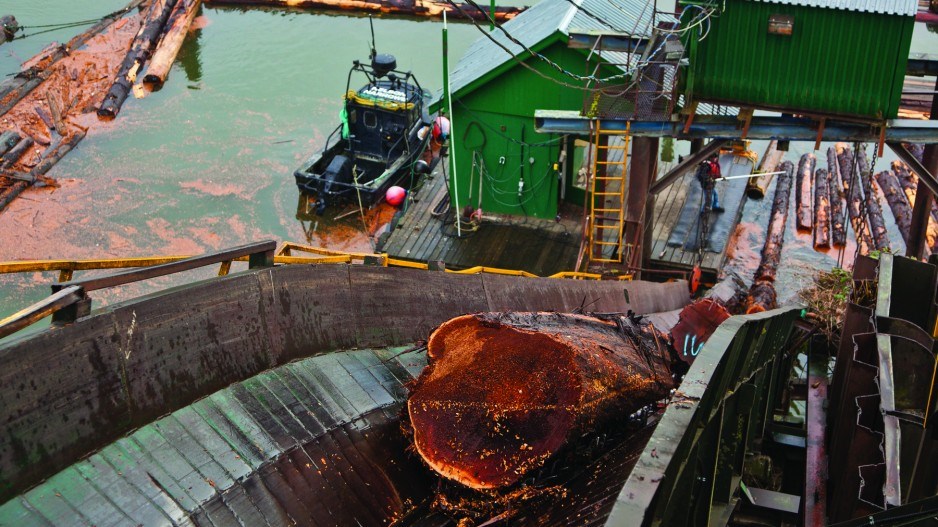Frustrated by a lack of progress in resolving treaty claims in B.C., the province’s First Nations are becoming increasingly entrepreneurial and investing in their own job creation.
The most recent example is the Haida First Nation. Its economic development arm added two significant properties to its business portfolio recently with the acquisition of five luxury fishery lodges and a $12.2 million tree farm licence (TFL).
Haida Enterprises Corp. (HaiCo) bought TFL 60 from Richmond-based Western Forest Products (TSX:WEF) at the end of June.
It has also acquired West Coast Resorts, which operates four luxury fishing lodges.
The sale of TFL 60 includes 130,000 hectares of timber on Graham, Moresby and Louise islands – the largest forest tenure on Haida Gwaii.
Taan Forest Limited Partnership, one of HaiCo’s business units, holds other forest tenures on Haida Gwaii, and the two tenures combined have an annual allowable cut of more than 440,000 cubic metres.
While some of the timber harvested from the tree farm licence will be processed on Haida Gwaii, some will be exported, and Western Forest Products will have first right of refusal on timber harvested over the next two years.
“We export some of our second growth – lower grade logs – overseas, to China, primarily,” said HaiCo CEO Kevin Ainsworth. “We want to do some smaller things, and some smart things with manufacturing.”
Roughly 75 to 80 people are employed on Haida Gwaii in forestry. The logging is done through a contractor, who has traditionally employed local residents, many of whom are Haida.
“We now have a log supply agreement with a local sawmill that is a joint venture with the Old Masset village council,” Ainsworth said. “These new projects will lead to more on-island, value-added manufacturing and jobs in an area with high unemployment.”
Ainsworth, whose family founded Ainsworth Lumber Co. Ltd. (TSX:ANS), was hired as CEO seven months ago by HaiCo.
Ainsworth also co-founded Merchant Advance Capital Ltd. and was CEO of Whispering Pines Energy Ltd., a Vancouver-based alternative energy company.
His background in both forestry and energy will come in handy, as energy is one of HaiCo’s four business units.
“We want to do something with biomass,” Ainsworth said. “We generate a lot of wood waste on island. As we move toward more manufacturing on island, you need to do something with the residuals.”
Haida Gwaii gets most of its power from diesel generators. Biomass power generation is just one potential energy alternative for the islands.
Studies have shown that Haida Gwaii has huge potential for offshore wind power, although it has equally large challenges in that the island has no electrical grid, which means an offshore wind farm would be capital intensive.
In the past, most of the timber cut from TFL 60 has been shipped off island. However, Ainsworth said an agreement with a sawmill in Port Clements has been struck to process more timber locally. HaiCo also recently invested in a pole-peeling operation for making utility poles.
“We have the right profile of log, which is a nice second-growth, straight cedar log,” Ainsworth said. “It’s a profitable business, and it’s six jobs, which is huge on Haida Gwaii.”
In addition to forestry and energy, HaiCo is investing in aquaculture and tourism.
HaiCo operates a bed and breakfast, and it recently reached a financing deal with the Bank of Montreal to acquire West Coast Resorts, which operates luxury fishing lodges in B.C., two of which are on Haida Gwaii.
HaiCo is a relatively new venture created in 2009 to operate as an independent economic development arm of the Council of the Haida Nation.
One of the key challenges native bands face in developing businesses and creating jobs is the federal reserve land system. Because it’s communal Crown land, native band land can’t be used to secure mortgages to fund businesses or other ventures. However, it can be leased long term, and the Osoyoos First Nation has been a leader in Canada in using revenue from land leases to invest in economic development.
The Osoyoos Indian Band Development Corp. owns and operates more than a dozen businesses – from vineyards and a ski hill to its own construction company.
“There are a lot of First Nations in the province of B.C. that are starting to get involved in businesses in a multimillion-dollar way, which is creating hundreds of jobs and creating their own revenue,” Osoyoos chief Clarence Louie told Business in Vancouver.
“Most First Nations realize that we can’t wait for land claims to be settled. The economy is always the No. 1 issue to white people, it should be the No. 1 to First Nations as well.” •




